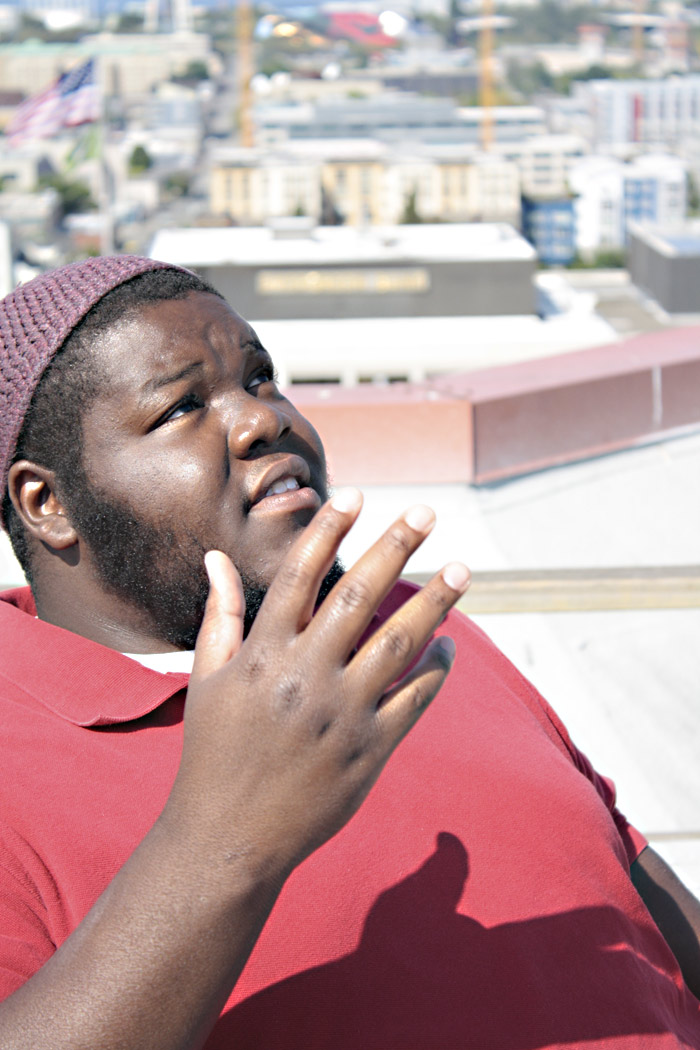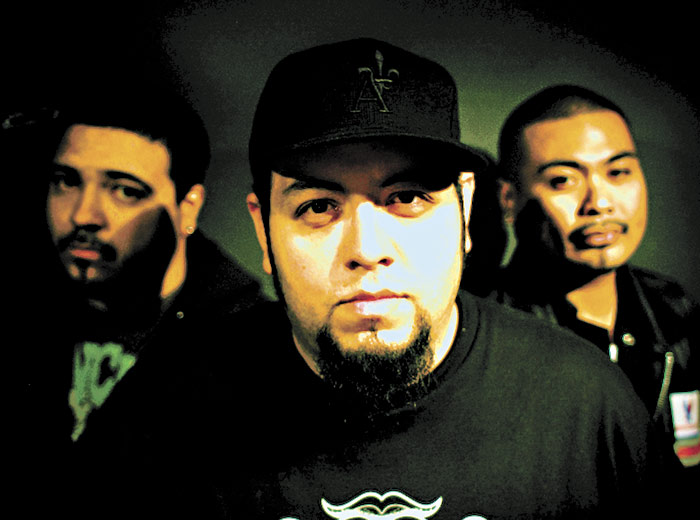The Creston Point Apartments in Skyway are busier than usual this recent Friday evening. The complex has more than 2,000 units, many filled with Somali Muslims who at 8:30 p.m. are just beginning to break their daily fast while observing Ramadan and are heading toward the gymnasium for their nightly prayers. Groups of men, women, and children casually stroll to the makeshift mosque where they’re allowed to pray in unison. Directly next door, in a nearly surreal setting, a far smaller group of black Christians led by local rapper D. Black are reading the Torah, talking about Judaism, and studying the Hebraic roots of Christianity. The juxtaposition is striking. You could chalk it up to the randomness of life in the South End, where cultures clash daily, but there’s far more to it than that.
For the past 10 months, Black (born Damian Black) has led a small ministry in these apartments every Friday night. Although the numbers are still small—12–20 attendees per night, including Black and his wife—those who show up clearly respect him as one of their spiritual leaders. Considering he’s only 22, that’s even more impressive, since most of the attendees, minus a smattering of small children, are older. Local rapper J. Pinder was on hand two weeks ago, worshipping alongside his girlfriend, and Sportn’ Life Records affiliates Fatal Lucciauno and Spaceman are regulars as well. This is the side of Black that Seattle music fans typically don’t see, but it is here, with Bibles, Torahs, and various other religious books scattered across the table, that Black is at home.
Around 9 p.m., after everyone has shared food and newcomers have been introduced, Black says, “OK, folks, let’s turn to John, chapter 15, verses nine through 17,” and designates an 8-year-old to read the passage aloud. When the Scripture is finished, Black leads discussions on love and faith, and helps folks relate those subjects to their own lives. As intimate and inspiring as this gathering is, most musicians with a brand new album—Black’s Ali’yah hits stores this week—would probably rather spend a Friday night at clubs or music venues, either playing a show or promoting their record. But Black isn’t interested in any of that. In fact, he’s ready to give up rap entirely.
“I’m done after this record,” he says. “I gotta promote this album and do some shows, but I’m finished. I’ve done music for so long, and without noticing it, I put music in the place of God. I worshipped it. I’d go to sleep thinking about it. I woke up thinking about it. But when I got closer to the divine, that changed.”
It’s possibly the worst time for him to walk away from music, because on Ali’yah (Hebrew for “ascending”), Black sounds more coherent than ever. It’s a far cry from his first album, Cause and Effect, full of bouncy club records and street anthems that sound as if Black’s trying to imitate what a rapper should sound like, rather than being himself.
“At one point, I found myself watching BET, MTV, and listening to the radio, only to find out what was hot, and tried to strategically make a record,” he says. “I was reaching…and me as a person and the music I was making didn’t line up.”
A big part of the reason so much of Black’s material has changed since his 2006 club jam “Get Loose”—and its video featuring girls gyrating in front of the camera—is the growth he’s achieved away from the spotlight. “In 2006, I lost my mom, I lost a few aunties, a couple uncles, my grandmothers, and aside from that, lost a lot of good friends,” he says. “It seemed like in 2008, guys were starting to murder each other. [That same year] my sister was shot in the leg when she was 13. It was all too much. I asked God to just show me the right way, and eventually he did.”
Although Black was already involved in youth ministries, and had spent time working at Seattle’s Union Gospel Mission’s Youth Reach Out Center in Rainier Valley, he wasn’t fully satisfied with Christianity as it was being delivered to him. He started delving further into his Bible, and says that when he fully conceptualized that Jesus was Jewish, the more intrigued he became. He now attends the synagogue of Beit Hashofar in Tukwila, observes Sabbath on Fridays at sundown, wears a kippah (also known as a yarmulke), and, like many Orthodox Jews, wears tzitzit (long, fringed tassels) on the corner of his pants, even when he raps onstage. But asked if he’s Jewish, he says no.
“I more so want my ministry to be for other non-Jews within churches who want to talk about the Hebraic roots of Christianity and the application of Torah within,” he explains. “I believe wholeheartedly that Jesus—well, I call him by his Hebrew name of Yeshua—was the Messiah. No doubt about it. That alone stops me from being Jewish.”
It’s evident that Black is still on his spiritual quest. When people ask him questions at the Friday-night Shabbat he hosts, he’s not afraid to say “I don’t know.” But he’s trying to set a strong example for himself and his family, and if that takes him away from the music world for awhile, he’s OK with that.
“I don’t want to say I’m quitting music entirely, but I’m transitioning,” he says. “Giving up rap is hard. But it’s God’s decision, not mine. It’s like he’s saying to me, ‘By you leaving the thing that you love the most, that would be the greatest testimony, because it shows that you’re being obedient to me.’ It was tough on me. At first I shed tears, but I’m ready to move on.”
That doesn’t mean Ali’yah isn’t worth enjoying merely because the album may be his last. Its 14 tracks encourage listeners to give their absolute best every day. Miraculously, it doesn’t come off as preachy; for those turned off by religious rap or praise hip-hop, that’s not what Ali’yah is about.
“I wanted to challenge the community,” he says. “I’m talking about rappers, preachers, pastors, rabbis, sheiks—whoever is up to take the challenge and put forth better thoughts. On Ali’yah, there’s a whole lot of ‘we,’ opposed to just ‘I.’ I wanted to speak in terms of community. Now that folks have heard it, I hear people say, ‘We need your voice, don’t leave right now.’ It’s like, I may not be able to do it myself because I want to be obedient to my call, but if I can help someone else get there, I’m OK with that.”






